Fruitless to flourishing: How family gardens are transforming Nicaraguan communities
Others, AgricultureContributed by: Compassion Canada
Written by: Compassion Canada
In the desert-like wilderness of Las Mojarras, Nicaragua, where the atmosphere is obscured by the rising walls of dust and merciless heat, the families of local Compassion centre, Center Emmanuel, are embarking on what their neighbours deem impossible. Despite the dryness of the land, they are planting family gardens.
Las Mojarras is a rural community where unemployment and financial difficulties run rampant. These situations were exacerbated after the sociopolitical unrest of 2018 and the onset of the global pandemic. As a result, many factories that provided families with a steady source of income closed their doors and left the community suffering from economic instability.
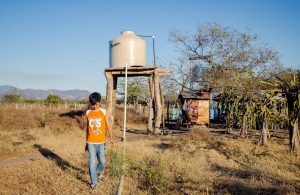
Yeri, who attends Center Emmanuel, walks across the dry land of his home in Las Mojarras.
During this time, Center Emmanuel opened its doors to the children of Las Mojarras. Andres, the centre director, quickly noticed that many families couldn’t make ends meet. “Many parents came to ask for help because they couldn’t feed their children,” says Andres. “At that time, we received the food packages for the families, and that helped a lot, but all the time, I kept thinking, ‘What can we do to help them generate income?’”
Andres remembered that several families had unused land due to a lack of available resources and a scarce water supply.
“The biggest blessing is knowing that the Lord has given us resources to create our own jobs and change our realities.”
After some brainstorming with other centre staff, Andres and his team decided to start a special project that would equip families with the tools they needed to cultivate sustainable gardens on their land. “Because not all of [the families at the centre] had land available, we made groups of five so they could work in teams to grow the crops,” Andres says. “They were enthusiastic and motivated!”
To start the project, Andres talked to parents who had previous experience with agriculture so that they could be the team leaders. Among them were Donald and Nuri.
Seeds of hope
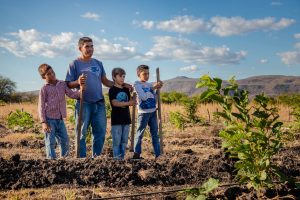
Donald and his boys, who attend Center Emmanuel, dream of the possibilities that the new family garden project through the Compassion centre could provide for their family.
Donald had always dreamed of turning his acres of overgrown land into a flourishing garden. As the search for factory work continually yielded fruitless results, this new opportunity provided by the centre planted seeds of hope for a new life. While Donald prepared the land for planting, there remained a situation in need of a solution.
“My house is four blocks from the river, which is the main source of water in the community, but I did not have the resources to create a watering system,” Donald says. “When the centre saw this, they provided me with the necessary materials to connect the pipes to the land where the crops would grow.”
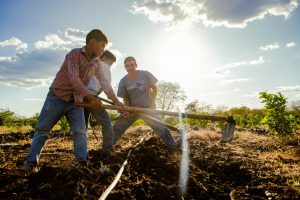
Donald began installing a power plant and irrigation grid to channel water toward families’ crops and additional produce such as watermelons, tomatoes, squash and zucchini.
“We are innovating,” says Donald. “The biggest blessing is knowing that the Lord has given us resources to create our own jobs and change our realities.”
Continuation of innovation
Nuri is a mother of five who never thought she would be working out in the fields as her husband oversaw planting and harvesting their crops. Nuri worked in factories or nearby homes providing laundering services. When the pandemic struck the community, Nuri lost both sources of employment.
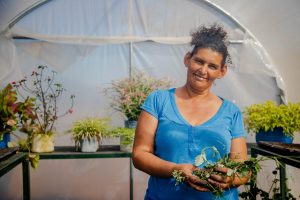
Yuri, mother of Yeri and Abner who both attend Center Emmanuel, inside of her greenhouse.
“I remember we couldn’t send the children to school,” Nuri says. “And because the land is so dry, during the summer months, we didn’t have anything to eat. I often felt tired and helpless.”
After the family gardens project began, Andres asked Nuri to lead one of the teams. Nuri, while glad to be considered, had her doubts. Although she had never worked the land before, she was willing to learn. “I asked the Lord for wisdom so that with every new skill I learned, I could teach the other families.”
Before long, Nuri came to Andres with a new idea. She hoped to start a small greenhouse in her backyard to teach her children and other mothers the necessary techniques to grow new seeds. The centre helped Nuri install a water tank that would carry the water to the ground inside the greenhouse through thin, plastic pipes.
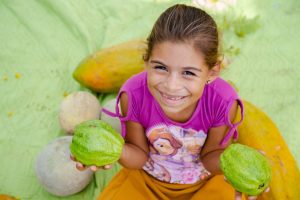
Belinda, one of the children who attends Center Emmanuel, shows off some of the fruits and vegetables her family was able to grow and sell because of the support from her Compassion centre.
“With this irrigation system, we make small holes in the water pipes so that when we turn the faucet, we can control the amount of water that the seeds inside the greenhouse will receive,” Nuri says.
As a result of Nuri’s innovation, the team she was leading grew spinach, lettuce and cabbage. For her, this project has been a blessing because it has given her the opportunity to teach her children to be resourceful business owners.
“I want to be a good example for [my children],” says Nuri. “I want them to see that change can happen if we trust in the Lord and put in the work, creativity and effort necessary to make it happen.”
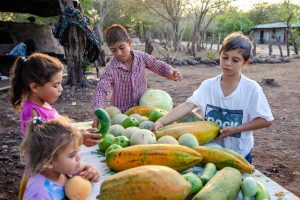
Originally published on: https://www.compassion.ca/blog/vegetable-seeds/

